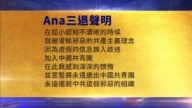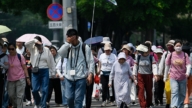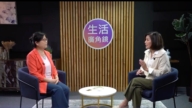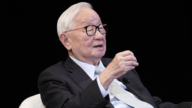【新唐人2013年03月15日讯】中共民政部官员日前表示,将允许民间慈善机构、工商协会、及其他一些非营利民间组织,直接向民政部登记注册,不必挂靠在党政机关。但政治法律性质和涉及外国的民间团体,仍然需要经过主管部门审批。
目前中国大陆合法的民间组织约有45万个,但却有250多万个非法组织。那些生长在中共体制下的民间组织,有什么样的成长空间﹖它们又该具备哪些条件才能获得公正的待遇﹖请看以下这则报导。
中共民政部部长李立国3月13号对媒体表示,民政部门要配合国务院机构改革职能的需要,从行政机关中剥离出一部分职能交给社会。
李立国表示,今后在市场经济领域和文化领域,一些协会、行会、慈善机构,可以由社会经营,以扩大社会组织在经济社会发展中的作用。民政部门将会同有关部门,加强对民间团体的登记审查和监管。
国务委员兼国务院秘书长马凯,在3月10号的的“两会”报告中也提到:成立行业协会商会类、科技类、公益慈善类、城乡社区服务类社会组织,可以直接向民政部门依法申请登记,不再需要业务主管单位审查同意。
中国“权利运动”网站负责人 胡军:“它跟大部制改革一样的,它总是想做出一种新的东西出来。但是,如果中共实质东西不做改变,这些东西……基本上处于作秀形式,不会起到多大的作用,因为它的严格审查制度。”
胡军认为,如果没有独立党派介入,民间组织的作用不会跟以前有什么区别。他指出,如果中共哪天不删贴了,大家不会因为说话而受到打击,说话也没有恐惧了,那么不需要“松绑”,民间组织也会自我生长。
目前,中国大陆合法的社会组织约有45万个。但有学者估计,另有250多万个民间组织处于“非法状态”。
近年来,要求降低民间机构登记门槛,为社会组织“松绑”的呼声日渐高涨。但目前,在中国像从事民间爱滋病防控工作、民间环保组织等草根组织,依然很难通过登记注册获得合法资格。
其实,早在2011年12月,民政部部长李立国就已经声明,那些推行公益慈善、社会福利、社会服务等领域的社会组织,可以直接向民政部门申请登记。
中国宪政学者陈永苗:“它内在有一个控制在那里,而且很多涉及到可能危害社会安全的或危害国家政治安全的,它是不会批的。然后会批的都是那些花鸟协会、或者是有挂靠单位的、没有涉及到政治的东西。基本上那些公益人士、公益组织,甚至没有涉及到政治的公益组织都批的极少极少的。”
中国宪政学者陈永苗还指出,中共对民间社团组织的管理,实际上一直按处理国内政治安全保卫的那种高度进行,并且,民政部想探索民间组织管理的方式是否能与其他部门协作,目前也看不清有什么进展。
另一方面,中国民间维权网站《六四天网》负责人黄琦认为,以后会在管理上放开的民间组织,主要是指那些官方认可、或官方自己通过官员所建立的那些所谓NGO组织。而从事人权工作的NGO组织,中共将会一如既往的继续打压,至于那些带有政治敏感性质的NGO更会受到官方的判刑。
据美国非政府组织“对华援助协会”的报告显示,2012年全中国家庭教会被迫害案件有132件,比2011年上升41%,受迫害总人数4,900多人,包括236名教会领袖,9人被判刑。
而今年,黑龙江、山东等地依然出现家庭教会被打压事件。
看来,中国民间组织获得公正待遇,还有很长的路要走。
采访/朱智善 编辑/宋风 后制/萧宇
Deregulation on Registration of Some Civil Groups in China
Recently, a Chinese Communist Party (CCP) civil affairs
official alleged that some non-profit organizations can
directly apply for registration in the civil affairs department.
Civil groups are no longer required to have administrative
affiliation to the Party, nor to governmental organs.
Yet, non-governmental organizations (NGO) involved
in politics, law and international issues will remain
subject to approval by superior administrative authorities.
Currently, China has about 450,000 registered civil
groups, and over 2.5 Million NGO’s cannot register.
How much ability, under CCP rule, do
civil groups in China have for growth?
How can they become legible in order
to get fair treatment? Let’s see the details.
On March 13, Li Liguo, CCP Civil Affairs Minister, told media
that the ministry will echo government restructuring plans.
That is, separating some administrative
functions and return them to the society.
According to Li Liguo, in the future some
organizations can be operated non-officially.
This includes associations, guilds and
charities in fields of economy and culture.
He said that this is to expand their roles
in economic and social development.
Li adds that the civil affairs departments, jointly
with relevant organs, will strengthen inspection
and supervision of NGOs registration applications.
On March 10, Ma Kai, secretary-general of State Council,
commented in a report given at the Two Sessions.
He said that setting up social groups in
the following categories can directly apply
for registration in civil affair departments.
The scope covers industry associations, chambers
of commerce, civil groups of science & technology,
of charity, and of urban and rural community service.
In these applications, approvals from superior
administrative authorities are no longer required.
Hu Jun, Chief of NGO Human Rights Campaign in China:
“It’s the same as the big-ministry reform,
intending to make novel changes.
But if the fundamental nature of the CCP
remains unchanged, they are merely for show.
It helps nothing under its strict censorship system.”
Hu Jun indicates that without the existence of independent
political parties, the role of NGOs won’t make any difference.
He says that if one day the CCP won’t remove online
posts, and no citizen will be the target of crackdown
for free speech, civil groups will inevitably develop
well even without the regime’s deregulation.
Currently, China has about 450,000 registered NGOs.
Scholars estimate that over 2.5 million
civil groups are still “illegal" in the country.
In recent years, appeals for lowering the barrier
for civil groups’ registration have been on the rise.
Yet until today, civil grassroots groups that engage in
AIDS prevention and environmental protection have
still found it hard to become registered in China.
In fact, Li Liguo made the same
proposals in December 2011.
That is, civil organizations involved in charity,
social welfare, and social services can directly
apply for registration in civil affairs departments.
Chen Yongmiao, constitutional scholar, China:
“It has a criterion for approval of registration.
It won’t approve those organizations that
it deems may endanger the regime’s rule.
It usually grants eligibility to associations of aviculture
and floriculture, and to those that aren’t related to politics.
For non-profit organizations, basically, few
applications for registration can get approval.”
Chen Yongmiao adds that all along, the CCP has dealt
with civil groups from a point view of stability of rule.
Moreover, concerning Civil Affairs Ministry’s collaboration
with other departments to administrate civil groups,
there’s no clear progress being made so far, he says.
Huang Qi, head of the rights defense
website 64tianwang.org, commented.
He says, the deregulation of civil organizations refer
to those NGOs that have official approval or that have
been set up by officials on behalf of the authorities.
Huang Qi believes that rights-defense NGO’s
will still be the target of CCP crackdowns.
And those NGO’s involving politics will even
risk the regime’s punishment, says Huang.
US-based NGO China Aid Association’s report shows
that in 2012, there were 132 cases of persecution
affecting Chinese House Church members.
This represents a 41% increase from 2011.
The number of victims exceeded 4,900, including 236
church leaders, with nine persons being sentenced.
In 2013, continuous crackdown on the Chinese House
Church remains in Heilongjiang and Shandong provinces.
It seems that China’s civil groups still have a long
way to go before the arrival of justice and equity.





























